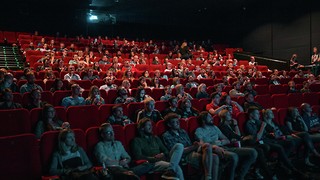Unsung, Unlikely… Unveiled
Not every sporting hero regularly graces the back page. Olly West salutes some of Cambridge’s lesser known but best-loved sporting icons.
Simon’s story
Bumping into Simon Storey, chef in St Catharine’s kitchens for the last 15 years and College footballer for the last ten, I ask him how the match he has just played went. “The ref was shocking, incredibly biased. It’s a good job I had to leave early or he’d have sent me off. One of our players said it was all in my head but I don’t believe him.”
I get the feeling that many people have heard this before, and Storey sheepishly admits: “I’ve always caused a lot of controversy in my time, but mainly it’s because students are too polite to say anything about dirty play. I know it doesn’t usually help the situation but I can’t help saying what I think.” Later he tells me he has been sent off four times for Catz, twice by Catz referees.
First team captain Max Pirkis had described ‘Simmo’, quite fairly, as “fat, slow but hugely skilled”, and warned me that he was “one of the most offensive on-the-pitch players you will come across”. Off the pitch, however, all I see is a love for his College, club, and sport.
Storey’s relationship with Cambridge football began at a young age; he remembers regularly going to watch the Blues take on the likes of Spurs and Arsenal as a 10-year old. He started to play for Catz after his divorce, an event which, he says, “saved his football career”. Since then, he has played regularly for the second and third teams and, in Cuppers, for the first team, gaining legendary status for moments such as the 2007 Cuppers final when his “clinical left-foot finish” clinched the title. What’s more, as he repeatedly reminds Blues star striker Matt Stock, he is the club’s “all-time leading goalscorer”.
Simmo has worked at five Colleges, but says Catz is the only one where the staff and students mix. It is something which helps to explain how the College regularly punches above its weight in sporting terms. At Storey’s last Cuppers final he was playing in front a large student faithful, but also the Senior Bursar and large number of fellows.
His appreciation for this inclusive atmosphere is plain to see, and in Storey’s opinion creates a healthy link between the University and city. It is no surprise the College takes to this passionate if unusual star of the football leagues.
Fit for Fitz
There is something most Fitzwilliam College Cricket Club débutants don’t know when their groundsman comes out to bat at number 8 for visiting sides who turn up with nine players: when their opponent made his own debut on a rather bigger stage, his first challenge was to see off none other than Ian Botham.
Indeed, prior to entering the dark world of Old Boys’ matches (and creating a character-building rite of passage for any aspiring Fitz bowler), Dave Norman was Cambridgeshire’s number 5 for ten years. Before that (slightly less obvious as you watch the ball sail over your head yet again) is that Norman was one of the meanest opening bowlers around at a time when quicks were two-a-penny. With Surrey at 19, England’s Trevor Jestey was among his scalps in a five match spell cut short only by a slippery pitch in Gloucestershire which resulted in a slipped disc.
Dave is very good at his job; a quick look at the Oxford Road playing fields on Google maps sufficiently demonstrates his artistry. At Fitz since 1997, and Queens’ for 12 years before that, Norman keeps Fitz as one of the outstanding University grounds, hired by University teams as well as the cream of local football and cricket sides.
It certainly supports his theory that “the best groundsmen have played sport”. Indeed, up there with Fitz as the best College playing surfaces are St Catharine’s and Clare. Catz is maintained by Chris Tovey, former Cambridge City player-manager, who took the local side to the FA Cup first round for two consecutive years. Meanwhile Clare, widely recognised as the best wicket in Cambridge and home to Cambridge’s biggest cricket side, Granta, is kept by Rob Nightingale, currently a City player himself.
Whilst the fight for a University Sport Centre rages on, it is reassuring to have access to such experience with the facilities that currently exist.
Discipline matters
As a scrum between John’s and Girton desperately collapses five yards from the Girton line, the tension is quickly diffused with a chuckle: “you’ve both let me down there”. The words are of Tony Kennedy, of the CID at Parkside Police Station, in his role as referee, something he has been doing for fifteen years.
Kennedy’s personality shines through; this is no faceless authority. “You have to meet 30 people and understand that each one reacts differently. That said, the common denominator in a good referee is being able to say ‘no’, which explains the high number of policemen, schoolteachers and doctors officiating.”
Whilst many a football substitute has found himself in the middle of a match trying to keep his mates and enemies happy staying out of the spotlight, the intricate rules of rugby require a referee who knows his job inside-out.
In Cambridge, it is David Allen, third-year historian, who organises officials for College rugby. It is a thankless but necessary task: drafting people in from several referee societies, sorting them by standard, fitness and form, considering their other commitments. College rugby referees are all volunteers, and Allen admits “we are lucky to have them. I won’t hear a bad word said against them.”
Allen himself referees local club games at weekends, and his coaches think he could reach the top; his own ambition is to reach the Premiership by the time he is 30.
Tony Kennedy is 54, “past his sell-by date”, but his enthusiasm is in no danger of fading. “I think most people do not understand what refereeing can offer you. You can turn up to any new place saying you’re a ref, and you’ll have a game on Saturday and a lot of new people to meet. Just look at the opportunities to travel you have as an international referee.” For now, Cambridge rugby players can be thankful he didn’t abandon them
Brawn over brain?
According to the Faculty of Neuroscience, Professor William Harris’ principal interest is “Molecular Embryogenesis of the Visual System”. The Cambridge University Ice Hockey Club beg to differ.
Christina Yek, women’s captain and goalkeeper, exclaims: “Forget the limp. Bill on skates is eighteen years old and whacks zingers at my head whenever he’s given the chance”, while for Jennifer Rutter, vice-captain 2008-2009, he is “the crazy guy with no helmet who taught me to skate, cracking his head open in the process”.
“The glue that has held the three Cambridge University ice hockey teams together for the past decade”, Billy-o, or Billy Boy, is a stalwart in defence for the ‘Eskimos’, the staff/second string team, despite his 59 years. Club President Richard Trueman recalls a game against a big and fast Munich University team, before which his only words were “Dude, I’m gonna get killed!” However, Patrick von Heimendahl, team-mate since 2005, asserts that “his speed increases with age. He doesn’t shy away from any hard checks and he leaves a trail of blood.”
Yet it is off the ice that the Bill’s presence is most strongly felt. He has coached the men’s and women’s Blues, as well as the Eskimos, for ten Varsity matches, but his extraordinary list of achievements and contributions is endless.
Take Doris, his Land Rover, who for years shuttled players and kit all over the country and is now, in his words, “looking up at that big motorway in the sky, but missing carrying hockey players” after serious engine failure on the M11 whilst carrying five players. Or look in his garage, converted into team storage shed for piles of big and smelly kit.
Even more incredibly, the summer is not a chance for Bill to rest, but the opportunity to organise informal roller hockey sessions. In a car park. That is only while not competing in inline-skating marathons, of course, or writing poems about matches.
However, beyond the surreal image of a world-renowned neuroscientist cutting his lip whilst on skates in a car park, the value of people like Bill Harris cannot be fully stated. As Club President Richard Trueman says, “Bill has done so much to support the teams and has spread the love of ice hockey far and wide with his infectious enthusiasm and incredible energy”. He is a volunteer at the Parker’s Piece temporary ice rink, campaigns for a permanent rink in Cambridge, and encourages links between the University and the Cambridge Inline Hockey Club, where he coaches the youth teams. Dedicating himself to the enjoyment of others, Harris has all the qualities of a true unsung hero.
 News / Tompkins Table 2025: Trinity widens gap on Christ’s19 August 2025
News / Tompkins Table 2025: Trinity widens gap on Christ’s19 August 2025 Comment / A plague on your new-build houses18 August 2025
Comment / A plague on your new-build houses18 August 2025 News / Pro-Palestine activists spray-paint Barclays Eagle Labs18 August 2025
News / Pro-Palestine activists spray-paint Barclays Eagle Labs18 August 2025 News / Pro-Palestine activists urge new Chancellor to ‘condemn Israel’20 August 2025
News / Pro-Palestine activists urge new Chancellor to ‘condemn Israel’20 August 2025 News / Trinity sells O2 Arena lease for £90m12 August 2025
News / Trinity sells O2 Arena lease for £90m12 August 2025









